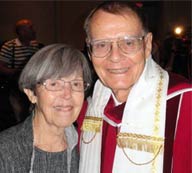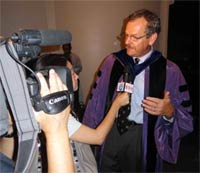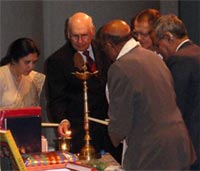On September 6, 2011, Claremont School of Theology, a distinguished United Methodist seminary with roots back to 1885, joined in partnership with The Academy for Jewish Religion, California, and the Islamic Center of Southern California/Bayan College. Together, they and a number of other affiliates have joined to create Claremont Lincoln University (CLU), an institution like none other before.
Training imams, pastors, and rabbis will be a core goal at CLU. Seminarians will have separate curricula and degree programs for clergy formation, part of a larger set of offerings and degree options focused on the interdisciplinary, intercultural, and multireligious needs of the world in the 21st century.
 A $50 million gift from David and Joan Lincoln made Claremont Lincoln University a reality.
A $50 million gift from David and Joan Lincoln made Claremont Lincoln University a reality.Others have helped open the door to interreligious collaboration. In the United States, Harvard University, Hartford Seminary in Connecticut, Auburn Theological Seminary in New York City, and Graduate Theological Union in Berkeley have been pioneers in multireligious higher education. Similar programs are brewing in other seminaries, and the Association of Theological Schools is paying attention. But CLU is the first fully accredited school in America for preparing imams – and having the three primary Abrahamic traditions training clergy in a shared environment is unprecedented.
This point was made over and over again when the $50 million enabling donation from David and Joan Lincoln made the story national news last May. Time Magazine’s headline ran Training Pastors, Rabbis, and Imams Together. USA Today went the same way with Theology school integrates studies of different faiths. In fact, the full story and its ramifications for theological education go much further.
 Provost Philip Clayton talked with the media after the inaugural convocation, starting with a news team from China.
Provost Philip Clayton talked with the media after the inaugural convocation, starting with a news team from China.“On behalf of humankind”
CLU’s new provost, Philip Clayton, is clear about the focus of the new University: “Finding the common threads among religious and ethical traditions – while honoring the distinctiveness of each” is the goal. The reach of this vision goes beyond Christian, Jewish, and Muslim interaction. Indeed, on the morning of the launch, a special, widely attended ceremony celebrated a letter of understanding bringing Jains into the new University, thereby including a South Asian religion into what had been an exclusively Abrahamic conclave. American Indian, Buddhist, and Hindu participation is expected.
In addition, CLU is developing collaborative projects with a number of organizations. As its new website states, “Claremont Lincoln University is more than a teaching institution. It’s a call to action on behalf of humankind.” To that end, it already has working relationships with:
- Doha International Center for Interreligious Dialog (Qatar)
- Council for a Parliament of the World's Religions
- Pacifica Institute
- Islamic Society of North America
- Institute for Religious Tolerance, Peace & Justice
- International Islamic University Malaysia
- Harbin Institute of Technology (China)
 CLU’s President Jerry Campbell joins a group of Jain leaders from the Federation of Jain Associations in North America to light a sacred candle commemorating Jain partnership in the new University.
CLU’s President Jerry Campbell joins a group of Jain leaders from the Federation of Jain Associations in North America to light a sacred candle commemorating Jain partnership in the new University.Institutional issues aside, the sweetness of this new collaboration comes through most clearly in a brief essay by CLU’s three founders. Published last week in the Huffington Post, their piece begins…
A rabbi, a minister, and an imam meet together for a year and something amazing happens...
In June of 2010, the three of us, Rev. Jerry Campbell, Imam Jihad Turk and Rabbi Mel Gottlieb, announced an agreement for our respective institutions to co-create the world's first inter-religious university – a place where rabbis, ministers, imams and other religious leaders would each be educated in their own traditions, side by side, but also with classes in common. The new university would include academic schools for students who wanted to do world-healing work in non-religious fields as well. The full story
At the September 6 inaugural convocation, the remarkable opportunity this new University represents was detailed most powerfully in the keynote address by the Honorable Ebrahim Rasool, South Africa’s ambassador to the United States.
… This is what the Claremont Lincoln University offers: an opportunity to share fragments of truth and pieces of the puzzle, firstly to overcome our own demons represented by the extremism, exclusivity and intolerance we spawned, and the way we have allowed some, in our name, not to follow God, but to appropriate God, and so contribute to the misery of society.
Simultaneously, we must allow the graduates of this institution to revel in the multiplicity of worship, ritual, pageantry and tradition, of the many faiths that must come to the Claremont Lincoln University, but they must also seek to enjoy the wonderment that comes from recognizing the Divine in each other, and acting on this insight in ways which cultivate a better world through compassionate relationships, collaborative efforts, and peaceful acceptance.
Ambassador Rasool noted the poignance of opening a University on the eve of the tenth anniversary of 9/11 and called for “Providence” to bless this new enterprise and its focus on a more peaceful world.
